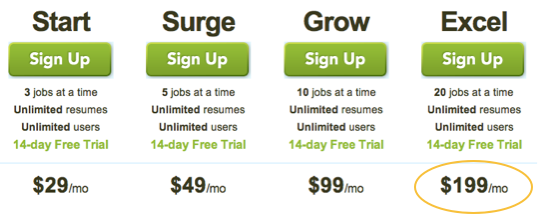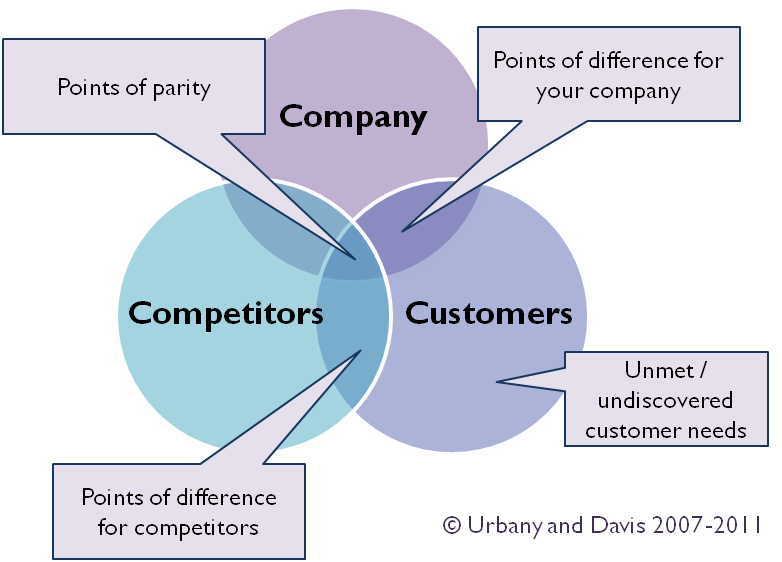In this section:
1. You will find out about your competitors' marketing strategy and the keywords they are targeting for SEO (Search Engine Optimization). They've spent efforts and money on marketing already, so you will indirectly learn a lot about your customers from your competitors.
2. You will find out about their pricing strategy, and how you can use that as a reference for your own pricing plan.
3. You will find out to see how your product is different from theirs, and how you can get a leg up on the competition.
Please write down the URLs of 3 competitors that offer alternatives to your product. Please write each of their names and their URL in their own line.
If you need help finding your competitors, try using this website (Alternativeto.net). Just search for 1 of your competitors, and it will show you the rest of your competitors and their ranking.
Example:
Facebook - www.facebook.com
Twitter - www.twitter.com
Pinterest - www.pinterest.com
Everyone must have competitors, because even if you don't see it that way, your customers still might see it that way.
Now go to their websites, sign up for their services, and test out their core features.
Really try out their service and see if you really offer something different from what they can offer. Most startups fall into the trap of thinking they know what their competitors are doing.
"It is said that if you know your enemies and know yourself, you will not be imperiled in a hundred battles; if you do not know your enemies but do know yourself, you will win one and lose one; if you do not know your enemies nor yourself, you will be imperiled in every single battle." - Sun Tze
The truth is that one of the key reasons why startups fail is that they fail to fully educate themselves on the existing available features, and they spend months finishing their product to realize that they've been building an existing feature.
What did you think about their services?
What are they trying to solve and what is their approach?
This is the reason why your customers will choose your service over that of your competitors'. This is also the first thing investors and incubators will ask. Be very thorough and honest with your research. If you realize that there is an overlap, consider tweaking your solution, or improving on it.
Also, the "difference" that you offer, is that really something the users care enough about to switch from your competitor's service to yours?
Write down the basic package pricing you see from your competitors’ websites. Each on their own line.
You want to record their pricing plans so when you decide the pricing for your service, you can compare you pricings to your competitors to see what would work.

Examples:
Digital Tutors
$45/month
So, do your competitors already have the solution for your customers?
All products are not created equal. While a competitor might solve 70% of the problem, but they are missing out on 30% of the most crucial components. This is where your startup can shine. The important point here is to understand exactly what your customers want so that you can solve that problem when your competitors cannot - thus winning over customers.
Also, just as an example of how understanding your customers can really make a difference - there have been cases where the differentiation feature is only a "better" visual interface.
Case Study: iCook successfully differentiated themselves by building the same cookbook iOS app but with bigger fonts. The reason was because the moms who use the app are do not have perfect eyesight. Therefore, re-building an app with bigger fonts and pictures actually helped them get funded, and a huge user base.
Therefore, iCook is a great example of a company who found out exactly what their target audience need, and then solving exactly that, while successfully differentiating with their competitors.

Now lets find out about your competitor's marketing/keyword strategy.
1. Go to the 1st competitor's website, on each of the page, mouse right click, and click on "View Source."
2. After that, see if there is a line that starts with this: <Meta name="keywords" content="keyword1, keyword2, keyword3,...">. If there isn't, it's okay, just go on to the next competitor's website.
3. The keywords after "content=" tells you what keywords a competitor is targeting. This will also help you verify whether the keywords you've chosen prior to this step are correct.
4. Repeat for 2 other URLs.
5. Check more competitor websites to gather more keywords.

Write down (or copy and paste) all those keywords that you have found. We will use these keywords for later use.
Examples (StartitUp):
start a startup, start a business, start a company, build a website, build a successful business, build your own company, launch a startup, launch your own company
The best way to find the keywords for your service is by observing your competitors. You can even use some SEO tools like Wordtracker, SEOmoz, and Spyfu to find out who is linking back to their website, so you can follow the same linking strategy - ask the linking websites to link to your website too (since they were willing to do it for your competitors). We'll get to that in the later stages on why you should do that, and how other websites linking to your website can help increase your website's "credibility" and get new users for you.
These keywords are super valuable, because your competitors most likely have done customer development, spent money on advertising, and understand how your customers think, and what keywords trigger their buying emotions. These keywords will also help you understand specifically which customer segment they are targeting. Knowing a company's targeted keywords is like knowing their marketing strategy outline.
Studies show that customers think with keywords. While a customer might get excited seeing a term like "Get fit in 3 weeks" doesn't mean he'll get excited by "Lose weight fast!". The reason is because the real motivation for this buyer might not be losing weight, but to get fit. So you can see how different and similar keywords can seem to each person.
Now that we've fully researched our competitors and have found out about their keyword/marketing strategy, think about how you are different, and if you can really differentiate yourself among the vast crowd of startups.
Nowadays starting a company is super simple, and does not require a lot of time or capital, so it's very likely someone already offers something similar to what you are doing. However, even if someone is doing something similar, don't be too discouraged, as the market is too big, and never only has 1 player monopolizing that segment.
Spend more time to research your competitors, make sure that they really don't offer what you can offer, then continue.